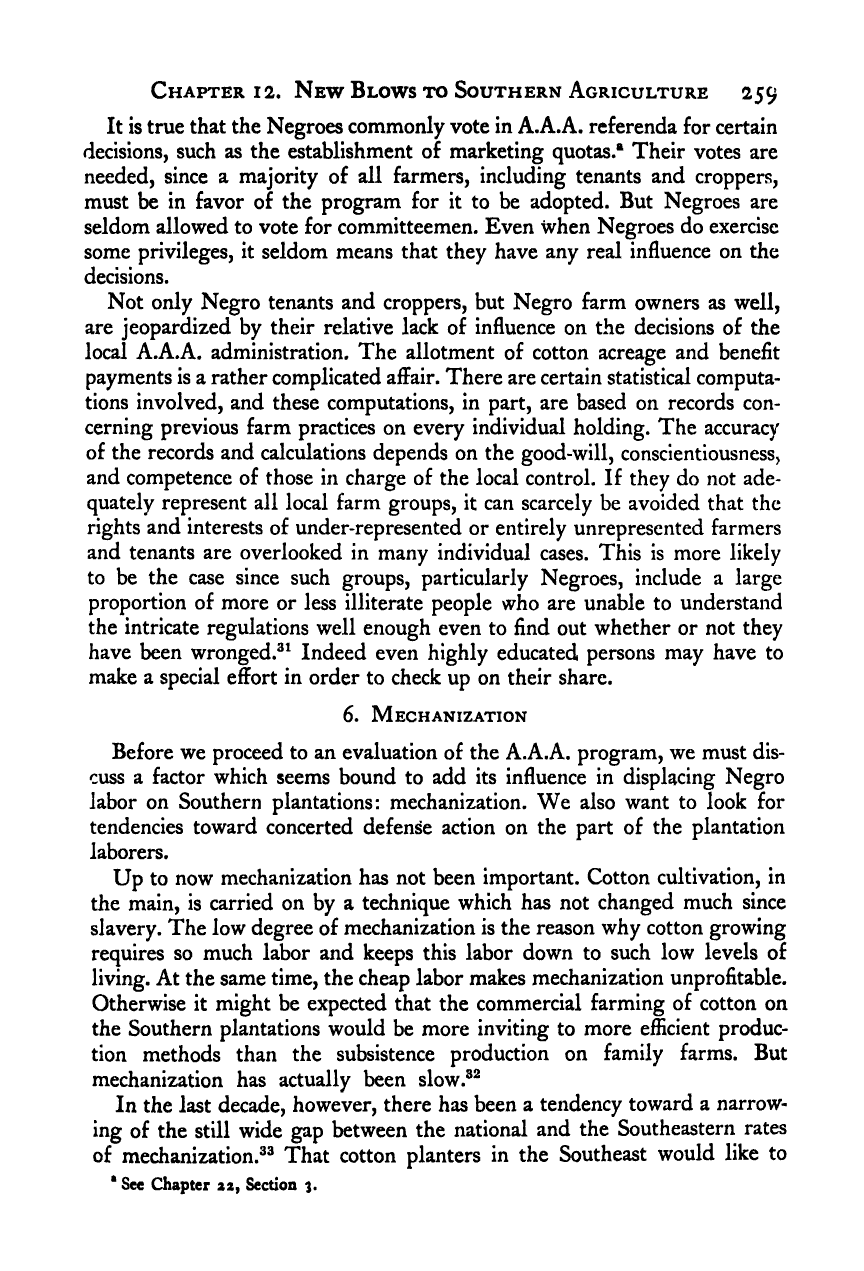Note: Gunnar Myrdal died in 1987, less than 70 years ago. Therefore, this work is protected by copyright, restricting your legal rights to reproduce it. However, you are welcome to view it on screen, as you do now. Read more about copyright.
Full resolution (TIFF) - On this page / på denna sida - IV. Economics - 12. New Blows to Southern Agriculture During the ’Thirties: Trends and Policies - 5. The Local Administration of the A.A.A - 6. Mechanization

<< prev. page << föreg. sida << >> nästa sida >> next page >>
Below is the raw OCR text
from the above scanned image.
Do you see an error? Proofread the page now!
Här nedan syns maskintolkade texten från faksimilbilden ovan.
Ser du något fel? Korrekturläs sidan nu!
This page has never been proofread. / Denna sida har aldrig korrekturlästs.
Chapter 12. New Blows to Southern Agriculture 259
It is true that the Negroes commonly vote in A.A.A. referenda for certain
decisions, such as the establishment of marketing quotas.® Their votes are
needed, since a majority of all farmers, including tenants and croppers,
must be in favor of the program for it to be adopted. But Negroes are
seldom allowed to vote for committeemen. Even when Negroes do exercise
some privileges, it seldom means that they have any real influence on the
decisions.
Not only Negro tenants and croppers, but Negro farm owners as well,
are jeopardized by their relative lack of influence on the decisions of the
local A.A.A. administration. The allotment of cotton acreage and benefit
payments is a rather complicated affair. There are certain statistical computa-
tions involved, and these computations, in part, are based on records con-
cerning previous farm practices on every individual holding. The accuracy
of the records and calculations depends on the good-will, conscientiousness,
and competence of those in charge of the local control. If they do not ade-
quately represent all local farm groups, it can scarcely be avoided that the
rights and interests of under-represented or entirely unrepresented farmers
and tenants are overlooked in many individual cases. This is more likely
to be the case since such groups, particularly Negroes, include a large
proportion of more or less illiterate people who are unable to understand
the intricate regulations well enough even to find out whether or not they
have been wronged.^^ Indeed even highly educated persons may have to
make a special effort in order to check up on their share.
6. Mechanization
Before we proceed to an evaluation of the A.A.A. program, we must dis-
cuss a factor which seems bound to add its influence in displacing Negro
labor on Southern plantations: mechanization. We also want to look for
tendencies toward concerted defense action on the part of the plantation
laborers.
Up to now mechanization has not been important. Cotton cultivation, in
the main, is carried on by a technique which has not changed much since
slavery. The low degree of mechanization is the reason why cotton growing
requires so much labor and keeps this labor down to such low levels of
living. At the same time, the cheap labor makes mechanization unprofitable.
Otherwise it might be expected that the commercial farming of cotton on
the Southern plantations would be more inviting to more efficient produc-
tion methods than the subsistence production on family farms. But
mechanization has actually been slow.®^
In the last decade, however, there has been a tendency toward a narrow-
ing of the still wide gap between the national and the Southeastern rates
of mechanization.^® That cotton planters in the Southeast would like to
<< prev. page << föreg. sida << >> nästa sida >> next page >>